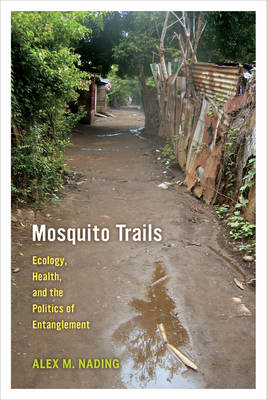
Mosquito Trails
Ecology, Health, and the Politics of Entanglement
Seiten
2014
University of California Press (Verlag)
978-0-520-28262-9 (ISBN)
University of California Press (Verlag)
978-0-520-28262-9 (ISBN)
Drawing on two years of ethnographic research in urban Nicaragua and challenging global health approaches to animal-borne illness, this title tells the story of a group of community health workers who struggle to come to terms with dengue epidemics amid poverty, political change, and economic upheaval.
Dengue fever is the world's most prevalent mosquito-borne illness, but Alex Nading argues that people in dengue-endemic communities do not always view humans and mosquitoes as mortal enemies. Drawing on two years of ethnographic research in urban Nicaragua and challenging current global health approaches to animal-borne illness, Mosquito Trails tells the story of a group of community health workers who struggle to come to terms with dengue epidemics amid poverty, political change, and economic upheaval. Blending theory from medical anthropology, political ecology, and science and technology studies, Nading develops the concept of "the politics of entanglement" to describe how Nicaraguans strive to remain alive to the world around them despite global health strategies that seek to insulate them from their environments. This innovative ethnography illustrates the continued significance of local environmental histories, politics, and household dynamics to the making and unmaking of a global pandemic.
Dengue fever is the world's most prevalent mosquito-borne illness, but Alex Nading argues that people in dengue-endemic communities do not always view humans and mosquitoes as mortal enemies. Drawing on two years of ethnographic research in urban Nicaragua and challenging current global health approaches to animal-borne illness, Mosquito Trails tells the story of a group of community health workers who struggle to come to terms with dengue epidemics amid poverty, political change, and economic upheaval. Blending theory from medical anthropology, political ecology, and science and technology studies, Nading develops the concept of "the politics of entanglement" to describe how Nicaraguans strive to remain alive to the world around them despite global health strategies that seek to insulate them from their environments. This innovative ethnography illustrates the continued significance of local environmental histories, politics, and household dynamics to the making and unmaking of a global pandemic.
Alex M. Nading is Lecturer in Social Anthropology at the University of Edinburgh.
Acknowledgments Guide to Acronyms Introduction: Dengue in the Landscape Part One: Infrastructure Chapter 1: City of Emergencies Chapter 2: Patrons, Clients, and Parasites Part Two: Bodies Chapter 3: Householding and Evangelical Ecology Chapter 4: Mosquitos, Madres, y Moradores Part Three: Knowledge Chapter 5: Stories of Surveillance and Participation Chapter 6: Dengue Season in the City of Emergencies Conclusion Notes Bibliography Index
| Zusatzinfo | 1 map, 2 line drawings, 10 b-w |
|---|---|
| Verlagsort | Berkerley |
| Sprache | englisch |
| Maße | 152 x 229 mm |
| Gewicht | 408 g |
| Themenwelt | Studium ► 2. Studienabschnitt (Klinik) ► Rechtsmedizin |
| Studium ► Querschnittsbereiche ► Prävention / Gesundheitsförderung | |
| Sozialwissenschaften ► Ethnologie | |
| Sozialwissenschaften ► Soziologie | |
| ISBN-10 | 0-520-28262-0 / 0520282620 |
| ISBN-13 | 978-0-520-28262-9 / 9780520282629 |
| Zustand | Neuware |
| Haben Sie eine Frage zum Produkt? |
Mehr entdecken
aus dem Bereich
aus dem Bereich
Befunderhebung, Rekonstruktion, Begutachtung
Buch | Hardcover (2024)
Springer (Verlag)
CHF 279,95
Ein praktisches Handbuch für Ärzte und Juristen
Buch | Hardcover (2020)
Urban & Fischer in Elsevier (Verlag)
CHF 329,95


